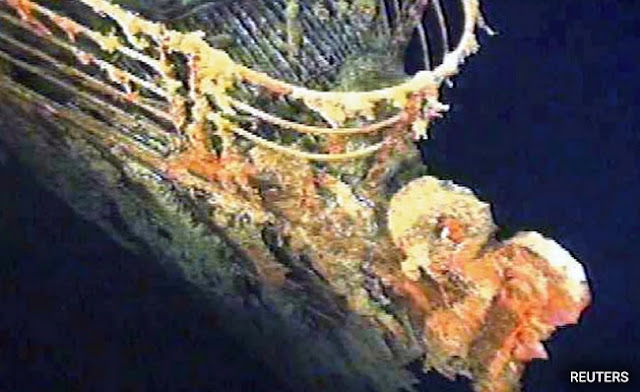One of those on board, according to his aviation company, is British businessman Hamish Harding, who had posted on social media about joining the expedition beforehand.
 |
| The Titanic hit an iceberg and sank in 1912 during its maiden voyage from England to New York |
Boston, United States: US and Canadian coast guard teams were racing Monday to locate a submersible vessel with five people aboard, including a billionaire tourist, that went missing on a dive to the Titanic's wreckage in the North Atlantic.
The 21-foot (6.5-meter) craft, operated by OceanGate Expeditions, began its descent early Sunday and lost contact with the surface less than two hours later, according to authorities.
One of those on board, according to his aviation company, is British businessman Hamish Harding, who had posted on social media about joining the expedition beforehand.
The US Coast Guard said it launched a sweeping search approximately 900 miles (1,450 kilometers) east of Cape Cod, Massachusetts, while the Canadian Coast Guard said it too had activated fixed wing aircraft and sent a ship to the search zone.
"It is a challenge to conduct a search in that remote area, but we are deploying all available assets to make sure that we can locate the craft and rescue the people on board," US Coast Guard Rear Admiral John Mauger told reporters in Boston, where he was overseeing the operation.
Time is a critical factor. The vessel has a range of 96 hours for a crew of five, and Mauger said Monday afternoon he believed it still had 70 or more hours of remaining oxygen.
On its website OceanGate Expedition says a dive expedition to the Titanic site was "currently underway."
The company uses a submersible named Titan for its dives to a maximum depth of 4,000 meters.
In a statement quoted by CBS News and other media outlets, OceanGate Expeditions said: "Our entire focus is on the crewmembers in the submersible and their families."
Harding, a 58-year-old aviator, space tourist, and chairman of Dubai-based Action Aviation, had posted Sunday on his Instagram account that he was "proud to finally announce" he had joined the OceanGate Expedition "for their RMS TITANIC Mission as a mission specialist on the sub going down to the Titanic."
"A weather window has just opened up and we are going to attempt a dive tomorrow," he added.
Action Aviation posted Sunday on Twitter that "the sub had a successful launch and Hamish is currently diving," and included several photographs of Harding and mission staff on the ocean surface.
Harding himself wrote that "the team on the sub has a couple of legendary explorers, some of which have done over 30 dives to the RMS Titanic since the 1980s."
On surface or underwater?
The US Coast Guard has launched two C-130 planes to survey the surface, while Canada has deployed aircraft "which utilizes sonar technology with buoys," Chief Petty Officer Robert Simpson told AFP.
He said that "after the expected time of return" for the submersible, the OceanGate ship "conducted an initial search and were unable to find anything or any sign of the submarine and they contacted the Coast Guard."
OceanGate said in its statement it was "deeply thankful for the extensive assistance we have received from several government agencies and deep sea companies in our efforts to reestablish contact with the submersible."
The Titanic hit an iceberg and sank in 1912 during its maiden voyage from England to New York with 2,224 passengers and crew on board. More than 1,500 people died in the tragedy.
The wreckage is in two main pieces 400 miles off the coast of Newfoundland, Canada, some 13,000 feet underwater. It was found in 1985 and remains a source of fascination and a lure for nautical experts and underwater tourists.
Without having studied the craft itself, Alistair Greig, professor of marine engineering at University College London, suggested two possible theories based on images of the vessel published by the press.
He said if it had an electrical or communications problem, it could have surfaced and remained floating, "waiting to be found."
"Another scenario is the pressure hull was compromised -- a leak," he said in a statement. "Then the prognosis is not good."
An underwater rescue While the submersible may still be intact during its dive, "there are very few vessels" able to go to the depth to which the Titan might have traveled.



No comments:
Post a Comment